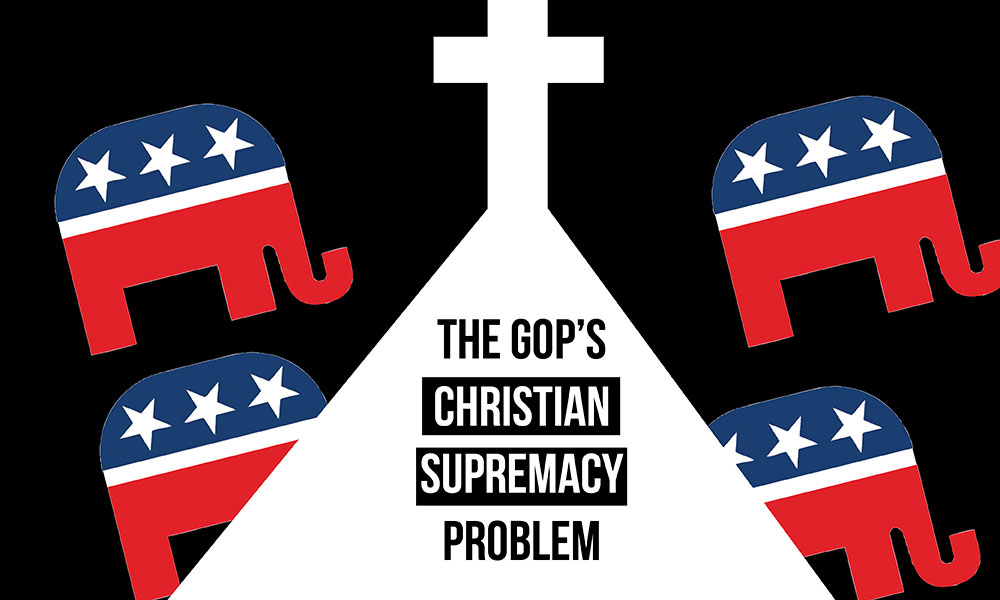The Republican Party has a Christian supremacy problem—which is also an antisemitism problem. The party’s failure to address it in any meaningful way is a dire threat to the religious freedom GOP partisans claim to so ardently safeguard. Indeed, it imperils democracy itself.
Take Doug Mastriano, the Republican nominee for governor of Pennsylvania. In April, his campaign paid a $5,000 “consulting” fee to Gab, the social media site run by Andrew Torba, an avowed Christian supremacist who has said that “we don’t want people who are Jewish” in America because “this is an explicitly Christian country.” His site is a sewer of hate and incitement to violence. It has platformed white supremacists, racists and neo-Nazis, including the rabidly antisemitic shooter in the 2018 Tree of Life Synagogue massacre in Pittsburgh. Not only did this horrific hate crime take place in the state Mastriano aspires to lead, but Torba has been repeatedly forthright in saying Jews are not welcome in his vision for a Christian state. “We are building a parallel Christian society because we are fed up and done with the Judeo-Bolshevik one,” Torba wrote on Gab’s Twitter account in 2021.
After Mastriano’s Democratic opponent, Pennsylvania attorney general Josh Shapiro, who is Jewish, criticized Mastriano’s ties to Gab on national television this summer, Torba became more combative. “We are going to build a coalition of Christian nationalists, of Christians, of Christian candidates at the state, local and federal levels, and we’re gonna take this country back for the glory of God,” he said in a video posted online. Mastriano, Torba proclaimed, is “our guy.” When asked by a Huffington Post reporter to comment on the $5,000 consulting agreement, Torba, who has said that neither he nor Mastriano will agree to interviews with journalists who are not Christian, didn’t respond but later sent the reporter an email including a command to “repent now…and accept Jesus Christ into your heart. Every knee will bow, yours included.”
The RJC has called Gab ‘a cesspool of bigotry and antisemitism.’
Pennsylvania rabbis and Jewish lawmakers called on the state’s Republicans to publicly oppose Mastriano. To its credit, the Republican Jewish Coalition called on Mastriano to cut ties with Gab—but stopped short of distancing itself from the nominee. Matt Brooks, the group’s president, “strongly urge[d] Doug Mastriano to end his association with Gab, a social network rightly seen by Jewish Americans as a cesspool of bigotry and antisemitism.”
While Mastriano did then apparently deactivate his Gab account, he was less than contrite about having embraced it in the first place. He purported to “reject antisemitism in any form,” but immediately segued to attacking Shapiro as an “extremist”—quite rich coming from a candidate who attended the January 6 insurrection. At a subsequent campaign stop, Mastriano waved away Jewish complaints about his campaign launch, at which a shofar was blown and Christian participants wore tallit.
In the radicalized Republican landscape, none of this has made Mastriano a pariah. Florida governor Ron DeSantis, considered a top contender to be Donald Trump’s political heir, headlined a campaign event for Mastriano in August. Dan Cox, the GOP nominee in the Maryland gubernatorial race, attended a rally with Mastriano that peddled stolen election lies and QAnon conspiracy theories, melding both with Christian nationalism. Cox also proudly touts Mastriano’s endorsement on his campaign website.
It would be bad enough if Mastriano were the only Republican running for top office this fall with an uncomfortable proximity to Gab and its ilk. In Arizona, Torba endorsed Republican Senate nominee Blake Masters, who rejected the endorsement, claiming he had “never heard of” the Gab CEO. But audio surfaced of Masters participating in a Twitter Spaces event (a live audio chat streamed through the Twitter app) with Torba just this year.
Masters is not alone in Arizona. The Republican nominee for governor, Kari Lake—a Trump-endorsed promoter of the stolen election lie—endorsed the Oklahoma state senate candidate Jarrin Jackson, who has an extensive record of posting viciously antisemitic diatribes online, including statements that “the Jews” are proof that “evil exists” and that “Jews will go to hell.” Only after an outcry did Lake, who has courted Trump’s Christian nationalist base, withdraw the endorsement. The Jewish Community Relations Council of Greater Phoenix condemned her “tepid renunciation” as “wholly insufficient.”
Trump, who infamously declared there to be “very fine people on both sides” of the neo-Nazi march in Charlottesville in 2017, may have perfected the art of the deflection from his embrace of racists and antisemites. But his acolytes are following his lead into even more incendiary territory, with federal, state and local candidates across the country openly embracing blatant and grotesque antisemitism. The phrase “never again” has never had more urgency in American politics than it does now.
Sarah Posner is the author of Unholy: How White Christian Nationalists Powered the Trump Presidency, and the Devastating Legacy They Left Behind.
Moment Magazine participates in the Amazon Associates program and earns money from qualifying purchases.



Antisemitic rhetoric is prima facie evidence of emptiness according to Jean Paul Sartre. When a political party clings to it, you’re seeing a panic-stricken death grasp in an ocean of information not grasped. It’s pathetic as well as dangerous and in no way is it EVER Christian.
very good, altho I doubt they have ever read, much more Sartre